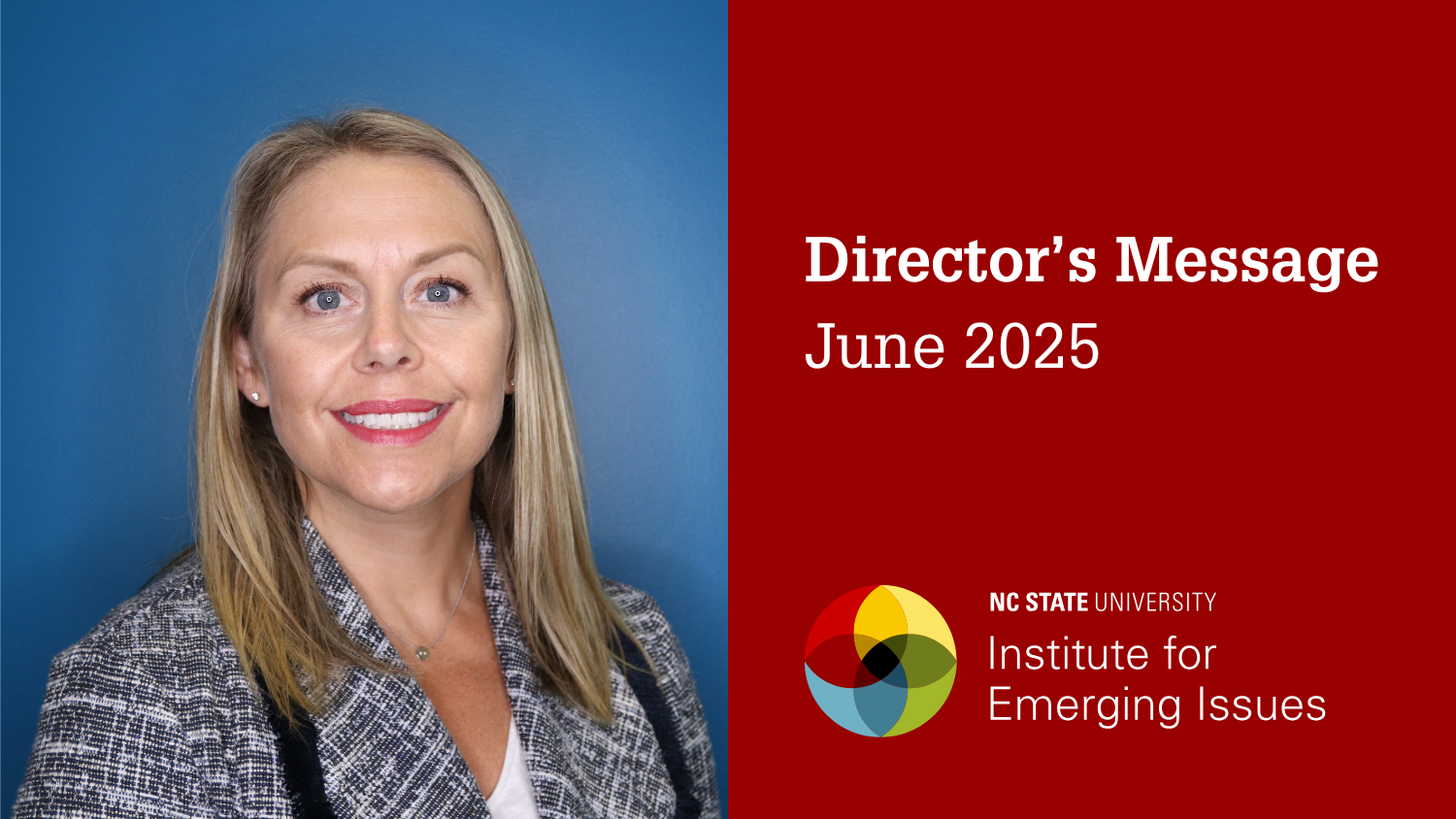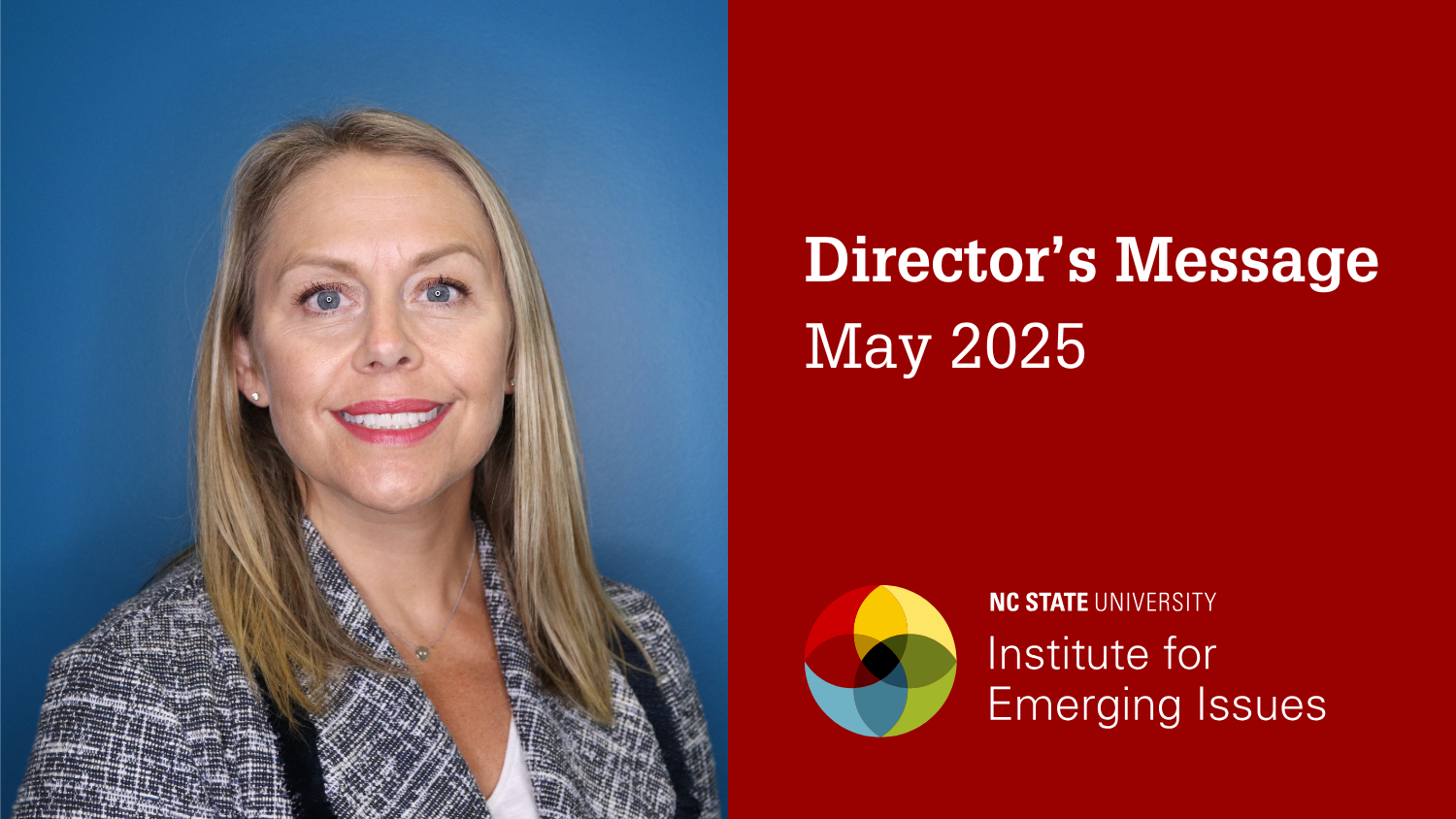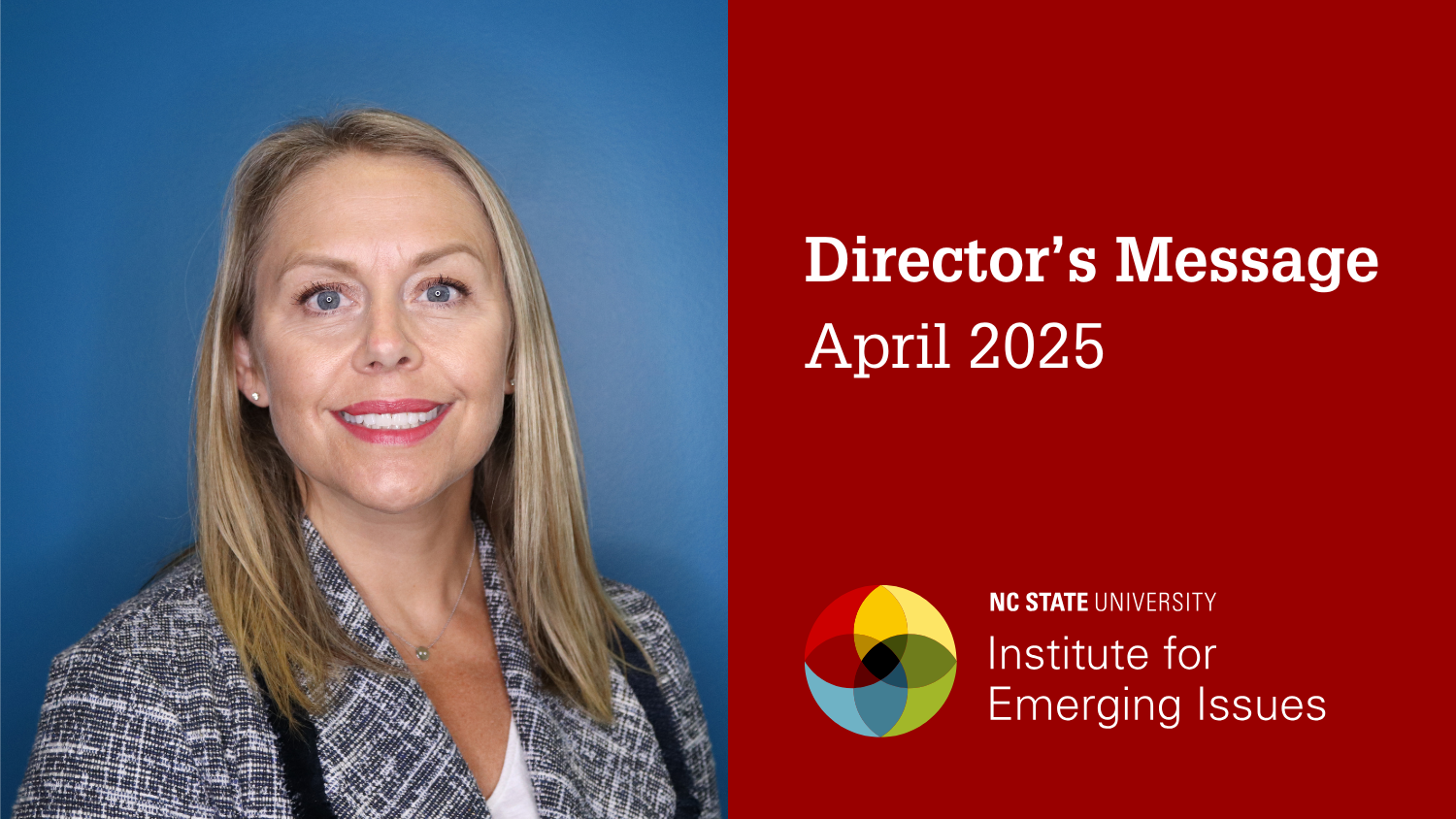Director’s Log | September 2021

5-4-3-2-1…Ignition!
IEI prides itself on facing forward, looking around the corner to see what big challenges and opportunities are coming to North Carolina, then asking you what we can do about them.
But it’s also important to look back and keep working on issues we have identified.
Some of you may recall we identified five “Ideas to Ignite” (see full text in our report here) at our February 2021 virtual Emerging Issues Forum – five efforts we believe will make our state better. I wanted to share a short summary on how things are going with those ideas – we’ll do another check-in in February.
Community Participation
Our ReCONNECT to Community Forum (November 2018, Asheville), the first in our six-part ReCONNECT NC series, called attention to the decline in participation in community life, highlighted the importance of learning skills to talk about difficult subjects without hating each other, and lifted up communities taking creative active approaches to getting more people involved in community building.
In our recommendations in February 2021, we pushed an idea called “$2,000 for 2000,” suggesting that adding a small amount of money to the stipend of those performing “service years” could pay big dividends in our communities – significantly increasing the number of people working on community-based projects.
In March 2021 a provision of the federal American Rescue Plan set aside $1 billion to increase incentives to perform national service and to make it more attractive to young people from lower-income families. Translating that dream into reality here will largely fall to the North Carolina Commission on Volunteerism and Community Service, but already promising projects are underway in North Carolina, including the newly-launched NC Education Corps, with 200 members across the state working to help students recover from learning loss.
Building Rural-Urban Bridges
Our ReCONNECT Rural and Urban Forum (February 2019, Raleigh) highlighted growing disparities between the state metro and less dense areas, and celebrated community-based efforts to bridge the divide.
The recommendation we lifted up at this year’s Forum was that we take intentional steps to bridge that divide. Building off of a pilot IEI tried with alumni of Leadership NC, since February, IEI’s Sarah Hall and John Parker have been working with three of our state’s most impressive nonprofits – Leadership NC, the Rural Center and the Wildacres Leadership Initiative – to explore what would happen if their nearly 3,000 leadership alums were to join forces and work together on big regional issues. We’re hoping to launch a pilot effort in 2022.
Making Educational Attainment More Affordable
Our ReCONNECT to Economic Opportunity Forum (October 2019, Charlotte) highlighted the struggle of adults with no credential beyond high school to connect to good-paying jobs and highlighted communities finding solutions to get them credentials and degrees that will enable them to support themselves and their families.
One of the biggest barriers is the cost of higher education. Adults returning to school don’t just have to figure out how to pay for tuition and fees, books and parking – they have to figure out how to replace the income they are losing by going to school, find transportation, handle childcare, get healthcare. Our recommendation this February was that every institution of higher education should create a comprehensive service to help adult students handle all of the costs of higher education.
This spring the NC Community College System, with the support of the John M. Belk Endowment, launched two studies to examine the effectiveness of two different services that provide the kind of wraparound support services we recommended. Currently more than 200,000 users have accessed these kinds of services. The findings from these studies may help speed deployment and adoption at all community colleges.
Learning, Earning, and Getting Healthcare from Home
At our ReCONNECT to Technological Opportunity Forum (February 2020, Raleigh) we made the argument that someday we were going to find that having broadband in the home was essential to learning, work and health care. A month later the pandemic hit, and we saw the struggle of those who didn’t have high speed internet available to them.
Through our BAND-NC program, we began making small grants to communities across the state (62 so far) working to increase the number of families with broadband in their home. This February, we recommended that every county in the state develop a “digital equity plan,” an intentional strategy to help every family, regardless of income, take advantage of the power of broadband. To date, 20 counties have either developed a plan or are in the process. With continued support from a growing number of sponsors, we plan to at least double that number next year.
Increasing the Supply of Mental Health Services
One of our three virtual forums during the Fall of 2020, ReCONNECT to Mental Health and Well-Being (October 2020) focused on the troubling spike in mental health challenges during the Forum, and highlighted community groups taking creative approaches to help more people.
The forum pointed up a serious undersupply of trained mental health professionals and inpatient treatment beds – research from the CDC showed an increase of 31% in 2020 in emergency room visits by 12-17 year-olds for mental health reasons. Our “idea to ignite” this February urged the state to expand “peer-operated respite facilities,” staffed by survivors of suicide attempts and experience with the system – not as a replacement for traditional mental health facilities, but as an important lower-cost addition to the continuum of services, one that could provide critical services to more patients.
This August, Promise Resource Network opened the first peer-run respite house in the state completely staffed by people who’ve experienced mental health challenges. We urge mental health professionals to closely study the success of such facilities, with an eye toward continued expansion.
Obviously there is a LOT of work to do to ReCONNECT, and we have been gobsmacked by the creativity and energy we are seeing from community groups across the state (take a moment to see all the approaches 26 different community groups are taking). But we also encourage you to join us in moving forward these 5 specific ideas, and we’re proud of the progress they are making so far. We hope you will join us. We need igniters!
- Categories:


